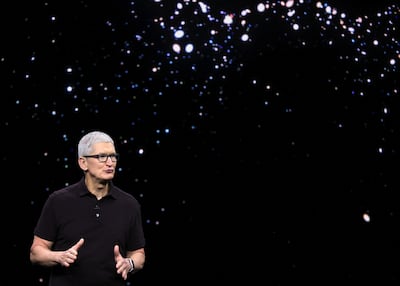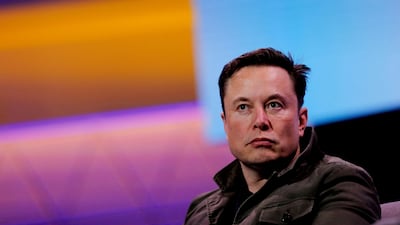The next war with global implications may not be fought on the battlefield or even limited to cyberspace – it could be a market share conflict between at least two of the American technology giants. This is a conflict with the potential to spill over into our day to day lives.
Mark that we narrowly avoided one this month – although war had already been declared, it only lasted a few days – when Elon Musk, no longer the world's richest person, took on its most valuable company, accusing Apple of threatening to remove his company Twitter from its apps platform.
Then, as we braced for retaliation, abruptly Mr Musk said he met with Apple chief executive Tim Cook and had "resolved the misunderstanding".
We were pulled back from the brink. The incident though brings up the very real scenario that it is only a matter of time before we find ourselves back on the same perilous edge again.
For example, what would happen should Google (owned by Alphabet) and Apple escalate their disagreement over the issue of text messaging? Yes, that is correct, they are arguing over text messaging.
Google’s campaign "Get the Message" aims to build enough public pressure on Apple to force it to upgrade SMS for non-iPhone users. Google makes the rival Android operating system for mobile phones.
“The frustration is real. People are talking about it. From tweets to TikToks the conversation is bubbling,” Google claims.
The issue for Google is the poor experience with SMS is keeping younger people from using Android phones. So it is a dispute over market share, since Apple makes the rival iPhone.
At the moment the battle is confined to the arena of software upgrades, with Google reportedly trying to cause issues for iPhone users who text Android phones.

Meanwhile, Apple and Facebook’s parent Meta are in direct competition over digital advertising. Apple’s privacy features including the “ask app not to track” service has had the effect of diminishing Facebook’s dominance over the advertising market. Mr Cook and Facebook chief Mark Zuckerburg have an openly icy relationship, to put it mildly.
So, if these companies are constantly locked in competition, why the concern of escalation now? The new reality is the rate of growth is slowing for these technology companies. It peaked during the Covid-19 pandemic when whole swathes of the world moved online amid public health related movement restrictions. These past few months however have resulted in job cuts and falling profits as forecasts and projections have proved to be overly optimistic.
When this becomes a trend, which is more than likely, there will be blood in the water and the sector will be at each other’s throats.
How could they hit back at each other? They could easily and immediately block access to each other’s platforms, as Mr Musk intimated Apple planned to do to Twitter. Cranking up fees and costs to use rival but essential services is another avenue. There could be tit for tat coincidental data hacks and leaks by unknown parties. Or retaliatory marketing campaigns that distort reality for users in favour of one company over another. Such things have inflationary ramifications. Every conflict does.
In conventional warfare, we see the contagion caused across borders and regions when two nations clash. Russia’s invasion of Ukraine has been felt, directly and indirectly, and worldwide in food and energy prices, trade supply chains, as well as culturally and socially. The conflict has also sparked a fresh refugee crisis with millions displaced.
An all-out conflict between tech companies would be felt by most people directly if not as desperately. But governments have little power to diminish this risk.
Following the experience of the past few years, from online misinformation and disinformation, to the impact on our mental well-being and the destruction of traditional business models, we know it is already urgent that regulators reduce the power of big technology.
In the US, little has been done despite lots of noise from Congress and it might be too late. In Europe, the EU’s General Data Protection Regulation, or GDPR, has provided some weaponry for the fight. But not much.
The users – you and I – are likely to be collateral damage from any war between the US tech giants. What will become of our data, our devices and our digital personal assistants? Will it be Alexa or Siri who triumphs? Would we be forced to say “Hey Google, so long”? Would the cloud become stormy? What if are all plugged into the metaverse and web3 when World War Tech hits? We would be even more vulnerable than we already are.
Also, many have put their money behind the tech sector’s continued health.
Apple, Microsoft, Amazon, and Alphabet are the top weighted stocks on the S&P 500 Index, creating outsize exposure for investors.
Jitters about the global economic outlook are already negatively affecting share prices. Civil war will drive them to the floor.
This is about more than portfolios though.
It is about quality of life. Technology has always held the promise of making the future better. We are no longer so naive as to think there is not a darker side. But as a society, we remain supportive of advances and innovation and that is largely a good thing. However, we need to find a way to ensure we don’t pay too high a price for this open mindedness.


